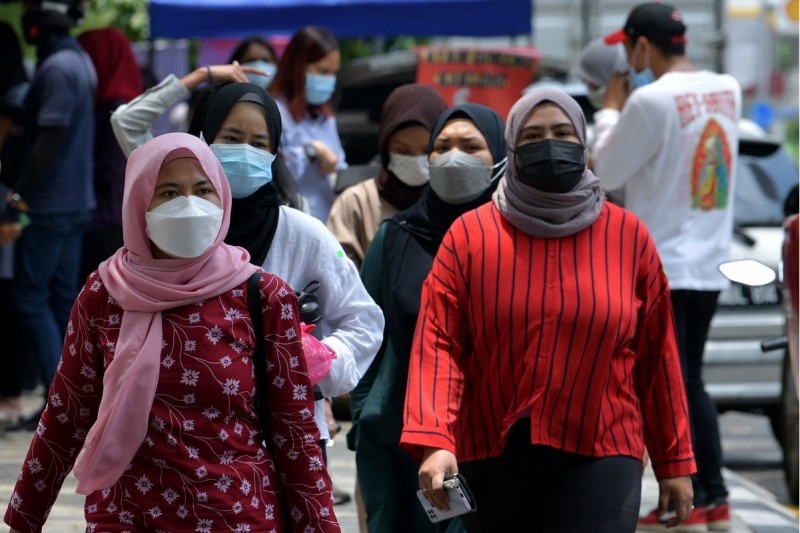
KUALA LUMPUR (Feb 23): Malaysia's labour market will continue to recover, amid a steady rise in job openings and the possible reopening of international borders in the second half of the year, according to MIDF Research.
In a thematic report Wednesday (Feb 23), the research house expressed confidence in the economic outlook for 2022 and said high vaccination coverage, including booster shots, could save Malaysia from severe restrictive measures such as the nationwide lockdown last year.
MIDF expects Malaysia's international borders to reopen no earlier than June 1, as it believes the government will push for higher population vaccination coverage and booster shots given the surge in Omicron variant cases.
“The inoculation for children in the 5-11 age group just started in February 2022 and will take at least 1.5 months to be fully vaccinated.
“As of Feb 22, 2022, two-shots recipients stood at 78.8% of the [country’s] total population while booster receivers at 43.1%. We believe by June 2022, the booster ratio will surpass 50%, while two-dose vaccinated persons constitute more than 80% of the population as more children are jabbed,” it said.
Once international borders reopen, the return of non-citizens to the labour market and the filling of low-skilled positions will increase companies' operating capacity and boost overall domestic economic activity, MIDF said.
“Due to the pandemic and uncertainties in Malaysia’s domestic economy, non-citizens left the country. For 2020 and 2021, we observed non-citizens exiting the country by almost 450,000. In fact, the population growth of non-citizens was already contractionary in 2019 among others due to global trade war effects. The impact of non-citizens exodus is higher today as the group population share had almost doubled in 30 years, from 4.3% to 8.2%. For the working population, the non-citizens represent about 10%,” said MIDF.
MIDF further forecast a decline in Malaysia's unemployment rate to 4% in 2022, supported by a further recovery in the domestic economy, continued upbeat momentum in global trade coupled with high commodity prices.
“As the economy moves into higher productive capacity, we expect Malaysia’s unemployment rate to decline from 4% in 2022 to 3.7% next year, nearing pre-pandemic levels of 3.4%. The decline mainly pushed down by 5.2% contraction of unemployed persons whereas employment growth at 1.6%,” it said.
FMM: Reopening of international borders necessary to support economic recovery
Meanwhile, the Federation of Malaysian Manufacturers is urging Putrajaya to reopen the international borders to fully vaccinated individuals (those who have also had their booster jabs) to reactivate businesses and the economy, and help address the unemployment caused by the unprecedented pandemic.
"Allowing international border crossing for fully vaccinated persons will help reinvigorate tourism activities, domestic retail activities and trade between countries and create a spillover into various subsectors when demand and supply activities get stimulated as well as import and export activities get further activated," it said in a statement.
“Particularly for the manufacturing sector, many companies that are on their road to business recovery are considering capacity expansion, new business opportunities, diversification of business and products, exploring new markets, et cetera. In addition, there are also companies commissioning new machinery and equipment as part of their business and product diversification, deploying new research and development (R&D) projects, and commissioning technology adoption from overseas vendors, all as part of their business revival strategies.
“Many of these would require for the business partners/customers, vendors, technical experts et cetera to be physically present here to seal the negotiations as well as to commission projects,” the FMM stressed.
In addition, the FMM believes that further relaxation of border restrictions, including the removal of existing approval and quarantine procedures, would reduce both idle time spent in quarantine and cost impacts.
“Alternatively, the government should increase the Vaccinated Travel Lane (VTL) arrangement as done with Singapore with other key countries that can be categorised into different risk levels based on their Covid-19 public health response and vaccination rates as well as Malaysia’s reliance on these countries for trade as well as tourism,” the FMM added.
Source: https://www.theedgemarkets.com/article/midf-sees-buoyant-labour-market-ahead-amid-possible-reopening-borders

